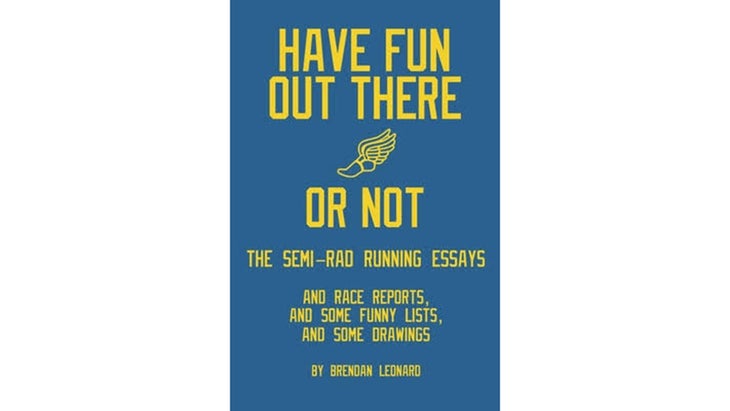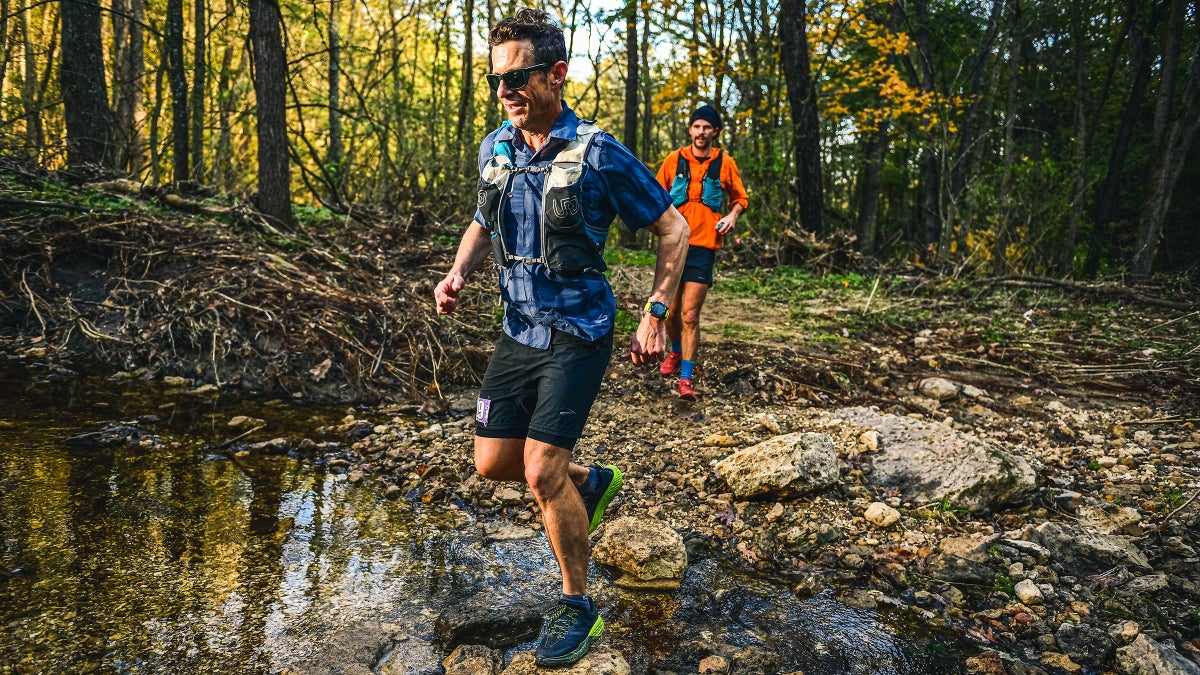No products in the cart.
Outdoor Adventure
Words of Wisdom from Brendan Leonard, the Everyman of Ultrarunning
Get full access to Outside Learn, our online education hub featuring in-depth fitness, nutrition, and adventure courses and more than 2,000 instructional videos when you
sign up for Outside+.
In his collection of running essays, Have Fun Out There Or Not, my fellow Outside columnist Brendan Leonard writes that, “Like anything worth doing, running long distances is about 90 percent tedious bullshit and 10 percent wonderful.” It’s hard to disagree. Leonard, who began running ultras in his mid-thirties, has a talent for chronicling his type-two exploits in a manner that is both earnest and wryly self-deprecating. He affectionately refers to other ultrarunners as his “fellow idiots.”
But there’s more going on here than just poking gentle fun at people whose idea of a good time is spending 24 hours lumbering in the wilderness, eating gels, and trying not to throw up on their Hokas. Leonard’s writing is a reminder that the bizarre rituals and obsessions of runners often reflect something more fundamental. For instance, in one illustrated essay, he elaborates on why he will do laps around a parking lot at the end of a run to round up the mileage on his GPS watch. For him, this isn’t merely an obsessive way to pad his Strava stats, but a kind of psychological safeguard to prevent his life from devolving into chaos and unproductivity. The notion is absurd—and for fellow runners, entirely relatable.
I spoke with Leonard about what drew him into ultrarunning, finding a balance between fun and “fun,” and why we shouldn’t knock participation trophies.

OUTSIDE: You start out your book by establishing that you only really got into running when you started doing ultras in your thirties? What was the appeal?
LEONARD: Ultramarathons are really hard, but for me there was a sense of: regular people do these things. I never thought of someone like David Goggins, who ran a ridiculous amount of miles, as some high-achieving superhero—a non-human who exists on a plane above us all, like LeBron James or Michael Jordan. That made it seem like I could be one of these people who does ultramarathons. When I started running these races, I would look around at the starting line and, while there were a few elite people, mostly it was just normal folks out there being idiots and trying something really hard. I find that really refreshing. I’ve looked around at the starting line of an ultramarathon and thought: if you took this group and stood them up in front of an audience somewhere and said: these people are very impressive athletes who are going to run 100 miles, the response would be, like: Really? These people? Including myself. It’s such a great thing for an everyperson to do, because it’s literally just about dogged persistence and doesn’t necessarily require real athletic talent. You don’t need to look like a gazelle when you run, you just need to keep powering through.
Before you were an ultrarunner, you were a climber. One of the essays in your book describes an episode where you witnessed someone take a bad fall and how your desire to keep climbing waned after that. Did ultrarunning become a substitute for climbing? Do the two pursuits scratch a similar itch?
Yeah, I think ultrarunning is all the pain and suffering of climbing without the constant fear. I love doing hard things, but in climbing I just never got strong or had good technique before I tried things that were hard for me. So I spent a lot of time having a ton of fear and anxiety about the things that I would be attempting. So it just got less and less fun and more of an anxiety-producing thing. And that incident really brought it home that I could fall 25 feet on one of these climbs and land on my face. It was a very visceral thing to be sitting there and watching this kid and realizing that he may not make it. He ended up being OK, but when you see that you are reminded that, yes, you can fall, and that there are these incidents where something small went wrong—a missed knot—and someone died or got really messed up. For me, it was worth it for a long time, but then it wasn’t worth it anymore. Also, I have a pretty frazzled workday, and running for an hour or two is such a great way for me to get away from all that stuff and really have some stillness in my life for a while. Running became a place for idea generation and just thinking.
In your book, you make the point that running often involves a lot of tedium with a few moments of bliss every now and then—a claim which, by the way, I think could also be made about writing. Can you elaborate on that?
There’s that saying: Do what you love and you’ll never work a day in your life. It’s not total bullshit but, honestly, I gave a graduation speech a few years ago where I said that if you love, say, 30 percent of what you do and tolerate the rest of it, well then you’re winning. I think nothing is 100 percent fun, except eating pizza and a few other things. And, usually, the things that are 100 percent enjoyable aren’t that rewarding. When I say: That was a great run! it usually means that if I’ve spent two hours on the trail, I probably had three or four minutes of being really present and thinking: Wow, that’s a great view! or, Listen to the birds! or, The creek is burbling! I’m not out there thinking these things the entire time.
In one of your essays, you mention that you host a podcast where you like to ask your guests how they are getting better at running without necessarily getting faster. How would you answer that question?
Oh man, that’s like my entire approach to running, really: enjoying it without focusing on speed. I think that might be more of a trail and ultrarunning mindset. If you’re into road running I could see how getting faster might be the most interesting part, but trail running, at least for me, has always been a means for exploration. I don’t know if I’m getting better at it, but the way I have “improved” to myself is that I have acquired not only the fitness, but the mental tools to be able to go out 25, 30 miles just by myself and go explore and see a new area, whether it’s a trail at the edge of town or running the Grand Canyon Rim-to-Rim-to-Rim. The whole goal for me was to see if I could get through these things.
In some circles, there’s an animosity towards the “participatory athlete,” someone who is more interested in experience than performance. Some of your essays seem like a refutation of that idea. Do you think that’s fair to say? Do you ever think of yourself as someone who is making the case for the participatory runner?
Yeah, I think I’m just in favor of more people leading fuller lives. I don’t want to be the person who tells other runners that they are somehow doing it wrong—even though that’s a really good way to get clicks on stories. I just feel that everybody is out there for a different reason. I’ve run a bunch of marathons. I don’t generally try to run very fast; it’s more of a tourism activity for me. It’s just fun to go out and see a city. I’m not trying to brag or anything, but running a marathon is not the biggest deal in the world to me now, and there are people out there who are just battling and it’s their first marathon and the biggest thing they’ve ever done athletically. And maybe they are doing it in someone’s memory, or for some other cause. I think in sports we tend to focus on the elite people, but in doing that we can miss a lot of the joy of a lot of people who are out there just doing it. One thing I love about ultrarunning is the way the last place person sometimes gets more cheers than the winner—especially in the really long races. One of my favorite clips of all time is when Gunhild Swanson finished, like, four seconds before the cutoff at Western States. She was 70. And in the clip people are going fucking bananas. I think the Western States belt buckle is the hardest-won participation trophy in sports. People who say, “Fuck participation trophies, if my kid gets one I’m giving it back,” I’m like: What do you want? Would you rather your kid is at home, sitting on their ass? I’d rather they get out and live a little bit.
Source link

